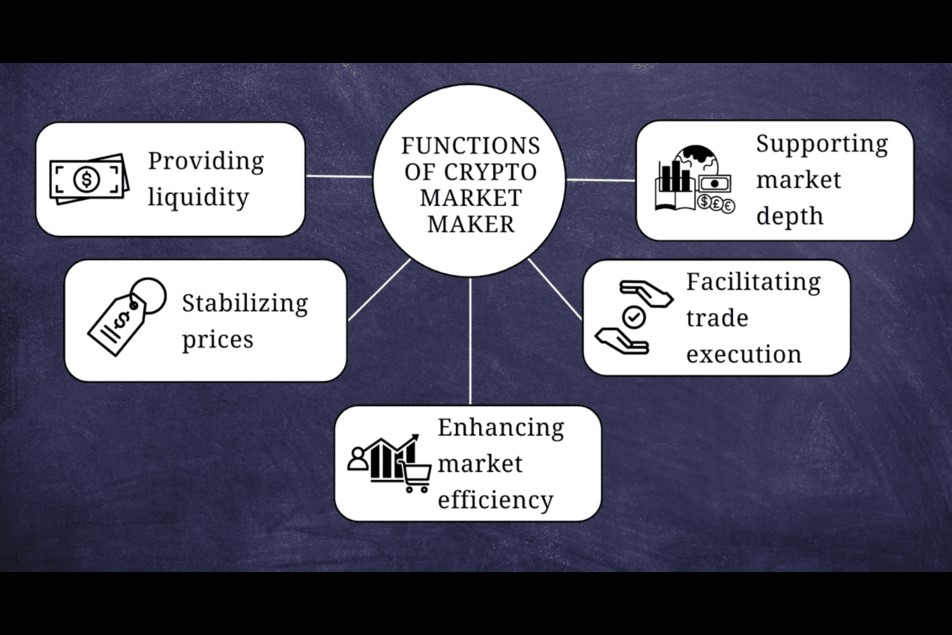What Is Crypto Market Making and How Does It Work?
Crypto market makers play a crucial role in the cryptocurrency sector, increasing the accessibility and liquidity of cryptocurrencies for traders and investors. This guide is a deep dive into the world of crypto market making, exploring its various aspects, working mechanisms, strategies, benefits, and challenges

What Is Crypto Market Making?
A Definition of Crypto Market Making
Crypto market making is the process of ensuring that the cryptocurrency markets function smoothly by providing liquidity and stability. Market makers are usually companies that place buy and sell orders, creating supply and demand and maintaining liquidity in the market.
Note that the requirements for becoming a market maker are tight, and only institutions specializing in market making as a core service can meet them. Crypto traders should ensure that the market maker and the exchange are separate entities to avoid conflicts of interest.
The Importance of Market Making in the Crypto Market
Market makers play an important role in maintaining liquidity in crypto markets, making them safe and attractive environments for trading. Their primary function is to guarantee sufficient supply and demand, as well as a high level of trading activity for a particular asset.
Crypto market makers also set ask and bid prices for trading pairs. In situations where there is no suitable counterparty, they can also operate as buyers or sellers. They make sure that traders can buy or sell Bitcoin and other cryptocurrencies at fair prices without facing significant price fluctuations, hence ensuring overall liquidity and stability in the market.

How Does Crypto Market Making Work?
How Market Makers Operate
Crypto market makers operate by continuously placing both buy and sell orders for a particular cryptocurrency, thereby providing liquidity in the market. Once a market maker receives an order from a buyer, they immediately sell their crypto position from their inventory, allowing them to complete the order.
Market makers generate revenues primarily by charging a spread on the purchase and sale of assets in the crypto market. The spread is the difference between the “bid” price (the price at which traders are willing to sell an asset) and the slightly lower market price (actual price). They also charge an “ask” price to traders who wish to buy an asset. The “ask” price is usually slightly higher than the market price.
The market maker’s profit is the difference between the price traders receive and the market price for a cryptocurrency. With this model, market makers can earn a profit without necessarily buying low and selling high, as is the case with traditional trading.
Examples of Market Makers in Crypto
Some of the top market makers in the crypto industry are listed below.
- Gotbit: Founded in 2017, Gotbit has emerged as a noteworthy market maker in the cryptocurrency world. It has achieved continuous growth and earned acclaim as a top market maker in the crypto market, with a strategy grounded in powerful algorithms, an extensive trading desk, and a client-focused platform. This platform enables clients to monitor their markets and Gotbit’s performance in real time.
- FalconX: FalconX is a crypto market maker that provides significant liquidity to various projects. It distinguishes itself by its automated trading capabilities, its ability to handle large orders, and its low latency in trade execution. The company’s market-making services are customized to the specific requirements of different projects, aiding in more accurate price determination and effectively mitigating price volatility.
- Wintermute: Wintermute stands out in the crypto market-making space with its algorithmic strategy, augmented by its exclusive over-the-counter, (OTC), trading desk, NODE, in addition to other operations in both spot and derivative markets. Wintermute boasts collaboration with over 50 cryptocurrency exchanges, including Binance, Coinbase, Uniswap, and Bybit. It provides liquidity to various Web3 and blockchain projects, including centralized exchanges (CEXs), decentralized exchanges (DEXs), and market maker (MM) pools.
- DWF Labs: DWF Labs is a global crypto market maker and a multi-stage Web3 investment firm. It’s recognized as one of the most prominent high-frequency trading (HFT) entities in the cryptocurrency space and actively trades in both spot and derivatives markets across 60 major exchanges.
- GRS Markets: Founded in 2013, GSR has grown into a global company with a workforce of over 300 professionals. The firm utilizes a strategic approach based on preset bid-ask spreads and key performance indicators (KPIs) of order books. The company also implements a wide range of risk management strategies, providing clients with a wider range of hedging options.
The Mechanics of Market Making
Bid-Ask Spread
Crypto market makers simultaneously place bid (buy) and ask (sell) orders at different price levels at the current spot price. This is aimed at capturing the spread—the difference between the bid and ask prices. Through the bid-ask spread, market makers provide opportunities for crypto traders to continuously buy and sell digital assets.
Order Books
Market makers also effectively manage the order books of the cryptocurrency being traded. This is done by maintaining balanced order books to reduce exposure to high price volatility. They achieve this by continuously adjusting their bid and ask prices to attract trades that will bring their order book to the desired level.
Market Depth
Crypto market makers enhance asset market depth by strategically managing bid and ask orders, ensuring sufficient liquidity that enhances the attractiveness of a given market. For example, a token issuer may collaborate with a market maker to improve their asset depth, creating a more liquid and active market for their tokens for wider adoption.
To do this, the market maker analyses the deviation in expected liquidity within a 2% range to identify markets that need support. Increasing market depth is important for enhancing price discovery, boosting trading activity, reducing slippage, and enhancing market appeal.
Strategies in Crypto Market Making
Algorithmic Market Making
One of the most common strategies used by market makers is algorithmic trading, which involves using complex computer programs to place bids and ask orders based on predefined rules. By using automated market making, these platforms can continuously provide liquidity, ensuring rapid and accurate order execution.
There are two main algorithmic market-making strategies: High-frequency trading and arbitrage strategies.
High-Frequency Trading (HFT)
High-frequency trading systems allow market makers to execute a large number of orders within milliseconds. This speed is vital in the highly volatile crypto market, which allows market makers to capitalize on price discrepancies and maintain a competitive spread.
Arbitrage Strategies
Crypto arbitrage strategies aim to minimize price discrepancies across various markets. For example, a market maker could buy an asset on one crypto exchange where prices are lower and sell it on another platform where the price is higher, harmonizing the prices.
Risk Management in Market Making
Crypto market making involves several risks, including price volatility, liquidity risks, and regulatory risks. Market makers are required to carefully manage these risks to ensure profitability and stability. Some of the risk management strategies used by market makers include hedging techniques and diversification strategies.
Hedging Techniques
Hedging reduces adverse price volatility risks by taking a position opposite to the existing open position. Hedging typically reduces exposure to the risk by mitigating the effects of the markets.
Diversification Strategies
Diversification involves spreading trades among different types of cryptocurrencies to help temper market volatility. Market makers use this strategy to reduce risks associated with an individual asset by spreading investments across different cryptocurrencies with varying risk profiles. Diversification allows makers to reduce the impact of adverse events affecting a single asset on their entire portfolio.
Benefits of Crypto Market Making
Crypto market making offers several benefits to the digital asset space, including:
● Increased liquidity: Crypto market making provides essential market liquidity, allowing traders to buy and sell assets with minimal price slippage.
● Price stabilization: Increased liquidity in the market helps in stabilizing prices with reduced volatility and makes the market more predictable.
● Enhanced trading experience: By providing continuous buy and sell orders, market makers improve the overall trading experience for all market participants, making it easier and more efficient to execute trades.
● Profit opportunities: Market makers can profit from the spread between bid and ask prices, creating opportunities for consistent revenue generation.
● Enhanced market efficiency: Crypto market making enhances market efficiency by ensuring that there is always a buyer and seller for a given asset, facilitating smoother and faster transactions.
Challenges in Crypto Market Making
Market makers face significant challenges that they must navigate to ensure the longevity and stability of trading operations. The main challenges include:
● Insufficient liquidity which can leave market makers unable to effectively execute trades.
● Regulatory challenges threaten the operations of market makers due to evolving legislation, which may impose unprecedented restrictions, constraints, and penalties.
● Market makers face operational challenges related to system or process failures which might lead to substantial revenue losses or reduced market confidence
● Crypto market makers are also exposed to highly volatile price swings, which can invalidate the intended benefits of market making.
● Failure of counterparties to meet their obligations can affect the market maker’s stability.
Factors to Consider When Choosing a Crypto Market Maker
- Trading volume: Choose a market maker who can support substantial trading volumes. High trading volumes are a confirmation of the firm’s capacity to consistently provide liquidity, particularly in times of high volatility or significant price swings.
- Order execution time: A good market maker should decrease the order execution time for traders.
- Reputation and expertise: A market maker should have a high level of expertise and a high standing in the crypto market. They should be renowned for integrity and reliability.
- Regulatory compliance: Ensure that the market maker adheres to the relevant laws, regulations, and guidelines for the market-making industry. This is critical to avoiding regulatory challenges and ensuring the integrity of your project.
- Costs and fees: Understand the firm’s costs and fees associated with their services. Different crypto market makers charge a variety of fees, including spread costs and/or commissions.
- Communication and support: Clear and effective communication is essential for a successful partnership. A crypto market maker should be willing to provide support and insights as well as offer strategic advice and adapt to changing market conditions.
The Future of Crypto Market Making
The future of crypto market making holds promise, driven by technical advances and evolving regulatory landscapes. As the industry matures and clear regulations are put in place, it is expected that increased institutional participation and a nexus with traditional finance (TradFi) will contribute to the growth and maturity of the industry. Technological advancements driven by machine learning and artificial intelligence are expected to redefine the way crypto market makers operate.
However, at CoinHint we believe that decentralized finance (DeFi) protocols could be the real game-changers since they have the potential to transform market-making services. DeFi protocols will make market makers more efficient and democratically accessible.
These advancements could address congestion challenges and high transaction fees, ensuring that market-making operations are efficient.
Conclusion
Crypto market making is crucial in the cryptocurrency industry since it stabilizes prices, offers essential liquidity, and improves the overall trading experience. Crypto market makers play the crucial role of preserving the depth and efficiency of the market using sophisticated algorithms and strategies.
Despite the inherent challenges, market making has significant benefits for investors, traders, investors, and crypto projects. It’s a dynamic and evolving industry, and innovation and regulatory developments will shape the future of market making, ensuring its continued importance in the financial landscape.
FAQ
-
Is market making legal?
Yes, market-making is legal, but it is highly regulated. Market makers operate under the laws and regulations of the jurisdictions they operate in.
-
Are crypto market makers regulated?
As in traditional markets, crypto market makers are governed by clear rules and regulations. However, due to its nascent nature, cryptocurrencies are freewheeling, not limited to country borders or specific agencies within a government. This poses a challenge for policymakers who are accustomed to working with clear-cut definitions for assets.
-
How profitable is market making?
Due to their crucial role in regulating the cryptocurrency market and providing liquidity, market makers can make a healthy profit.
-
What is the difference between wash trading and market making?
A market maker’s main objective is to earn a profit through the bid-ask spread by facilitating trades, while wash traders aim to manipulate market perceptions, artificially inflating trading volumes with no intention of being involved in genuine trading.








